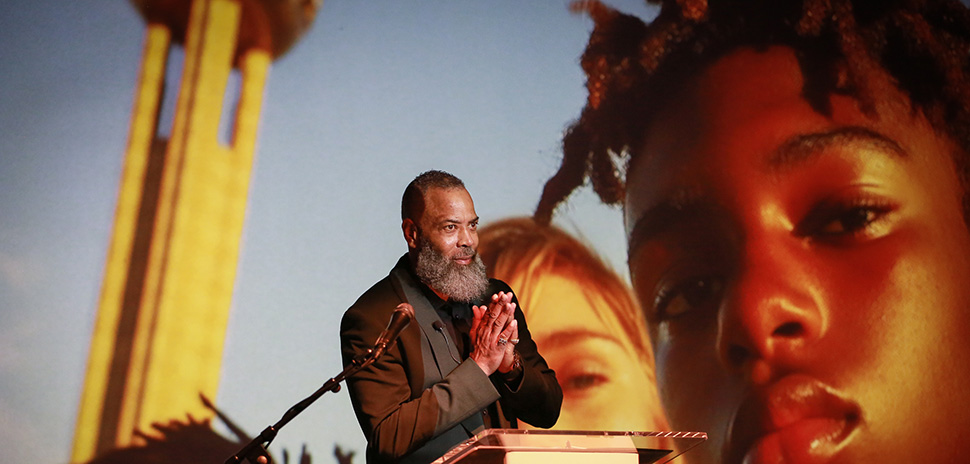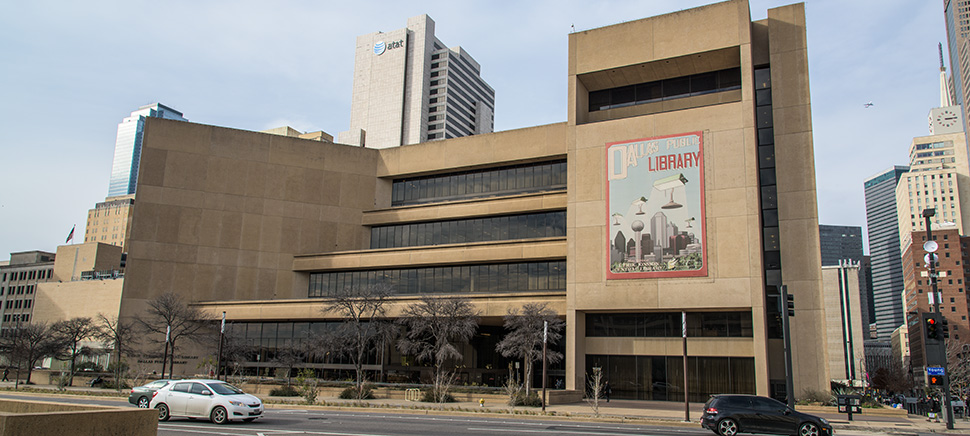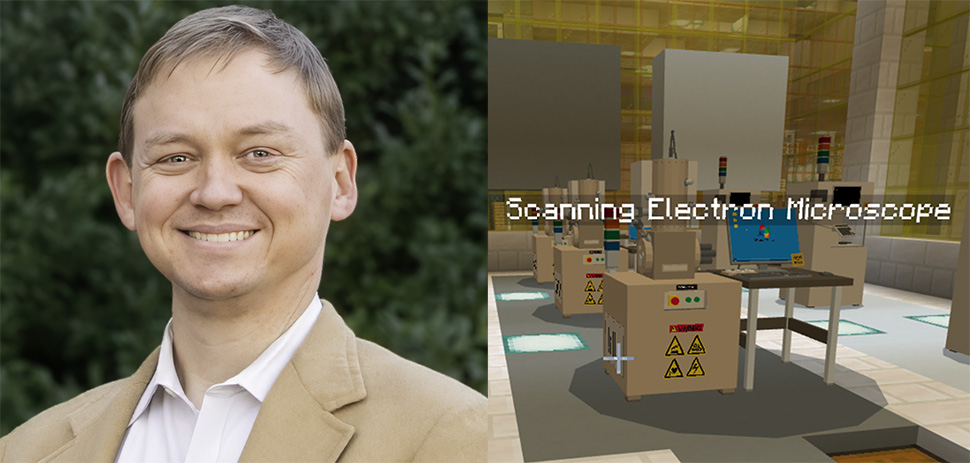If it all happens according to plan, Hollywood couldn’t write a better script. A hip-hop star who lost his voice in an accident returns to his hometown, where he starts a nonprofit that helps underserved youth stay in school, land great jobs, and support his quest for change and healing.
That was the vision laid out at Oak Cliff’s Kessler Theater last Thursday night, when 250 people turned up for the launch of a pioneering educational initiative called the Dreams Experience Academy. Dubbed DEA for short, the nonprofit program aims to provide under-championed youth in grades 7-12 with skills and pathways into high-demand creative and STEM-based industries, such as media, technology, and entertainment, free of charge. The DEA will target southern Dallas first, then roll out to other communities.
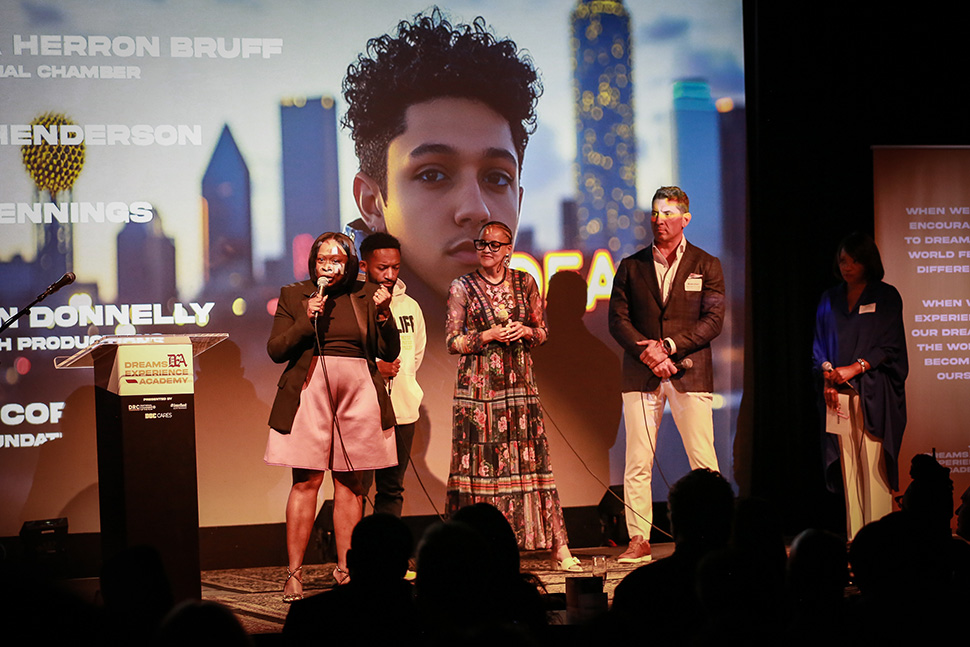
On-stage presenters at the event included, from left, Latosha Herron Bruff of the Dallas Regional Chamber, Xavier Henderson of For Oak Cliff, GameSquare’s Malia Jennings, and Brendan Connelly of Bosque Ranch Productions. [Photo: Dallas Regional Chamber]
The initiative is the brainchild of hip-hop legend Tracy “The D.O.C.” Curry, 56. The D.O.C., who won a Grammy Lifetime Achievement Award in 2024, is an influential, Dallas-reared rapper, songwriter, and record producer who co-founded Death Row Records and penned material for the likes of Snoop Dogg, Dr. Dre, Eazy-E, and N.W.A. But the hero story of The D.O.C.—most just call him “Doc”—has a dark side, too. After releasing his own landmark LP, “No One Can Do It Better,” in 1989, The D.O.C. fell asleep at the wheel on an L.A. freeway late one night and crashed his car into the center divider. The near-fatal wreck sent him flying out the window and into a tree. Permanent damage was done to his vocal cords.
Over the next decades, The D.O.C.’s struggle to reconcile the loss of his natural voice—today it’s low and raspy and strained—as well as his recording identity led to the production of a documentary film about him called “The DOC.” Although the film “premiered” at New York’s Tribeca Film Festival in 2022, it turns out that its wider release has been held up due to a business dispute. In fact, footage of The D.O.C. and his activities continues to be shot for the documentary, which might best be described as a work in progress.
So, that explained the multiple videographers in the crowd at the Kessler last week, dogging The D.O.C.’s every move from the moment he entered the theater. The invitation to the launch event had advised guests to “dress to impress,” and many had. Inside the packed lobby before the formal program began there were dark suits and ties, fancy shiny jackets over long skirts, cowboy hats and Rasta caps. Waiters threaded their way through the throng offering sliders, chicken skewers, and small bruschetta bites. In one corner, a musician named Clover played eclectic tunes on a 3D-printed electric violin shimmering with LED lights, accompanied by a pedal-activated backing track.
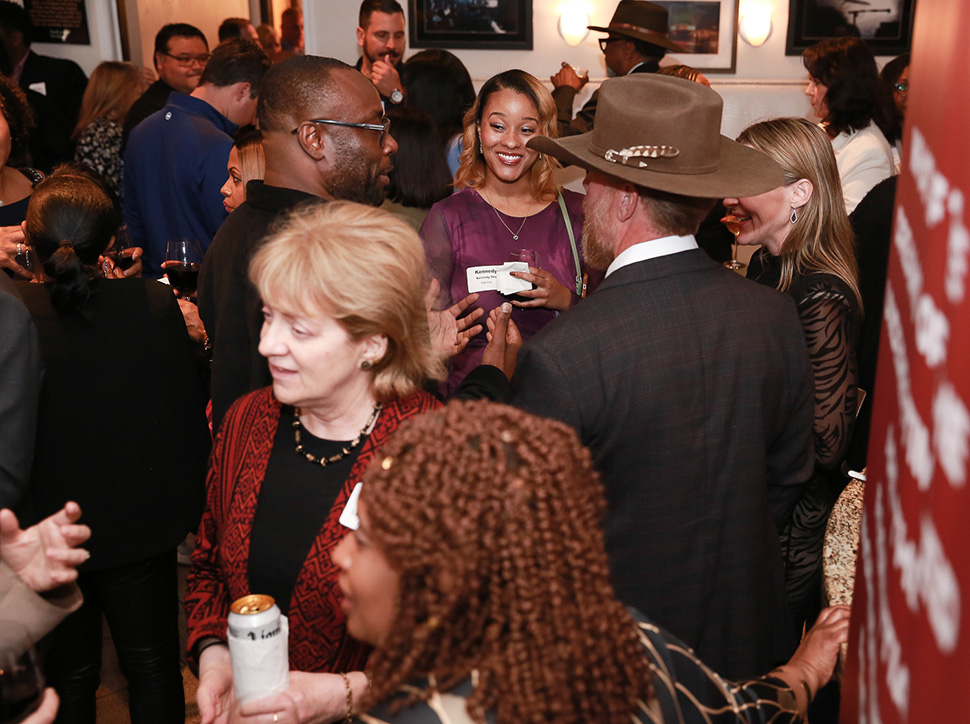
The crowd in the Kessler lobby had been advised to “dress to impress,” and many of them did. [Photo: Dallas Regional Chamber]
Who were the guests, I wondered. “Corporations, community stakeholders, people in gaming and the music industry,” said Latosha Herron Bruff, senior vice president of opportunity and impact with the Dallas Regional Chamber.
The chamber, along with The Dallas Foundation, had provided seed funding for the DEA, she said, because the nonprofit’s goal—providing economic opportunity for all—aligns with the mission of the chamber.
The Kessler event “is an opportunity for the business community to move from commitment to action,” Herron Bruff added. “We want business support. Partners are going to give money tonight.”
Closing the generational opportunity gaps
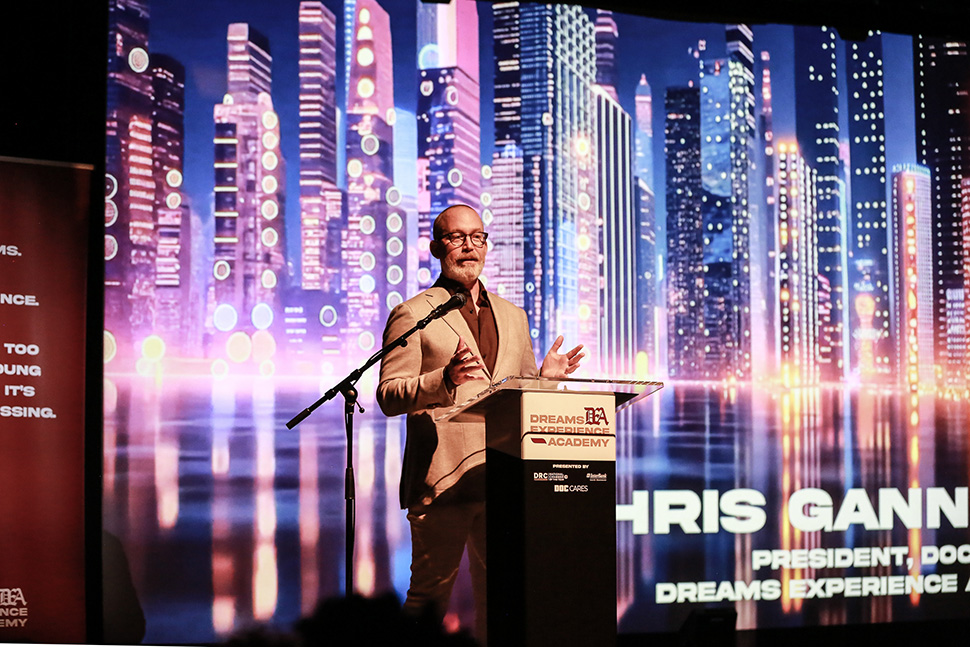
Chris Gannett, the president and co-founder of DOC Cares, the DEA’s nonprofit parent, said the education initiative will be aimed at students who typically “don’t have a cousin in marketing at Netflix.” [Photo: Dallas Regional Chamber]
Soon enough the crowd settled into their seats inside the theater, where Chris Gannett—the president and co-founder of DOC Cares, the DEA’s parent 501(c)(3)—took the stage as the evening’s emcee.
Gannett, CEO of the Dallas-based executive coaching, advisory, and capital firm Gannett.Partners, explained that DEA—DOC Cares’ flagship initiative—would have a two-fold purpose.
First, because participating students will need to be enrolled in school, it will address the problem of absenteeism, especially among underprivileged students. In Dallas County’s 75216 ZIP code, for example, students who re-enrolled in school after the pandemic are experiencing up to 47% chronic absenteeism, he said.
At the same time, there’s a “significant disparity between those who inspire and consume” products produced by the $3 trillion media, entertainment, and technology industries and the people who benefit from creating those products, Gannett said. Nearly three-quarters of consumers think the media and entertainment industry fails to reflect its customer base, and just 8% of Hollywood CEOs and board chairs are people of color, studies show.
The DEA, Gannett said, will address these systemic issues by investing in the next generation of media, entertainment, and tech leaders, helping communities accelerate economic independence and close “generational opportunity gaps.” It plans to do this through a combination of experiential learning and career readiness programs, and by pairing students with real-world projects sponsored by the initiative’s partners. Among the partners so far are GameSquare, Brag House, Taylor Sheridan’s Bosque Ranch Productions, Interbank, Stemuli, Vela Wood, the T.D. Jakes Foundation, For Oak Cliff, and the Big Thought Institute, which developed the DEA curriculum.
The Dreams Experience Academy’s hands-on career-readiness programs will give a leg up to under-championed students, Gannett said, who typically “don’t have a cousin in marketing at Netflix.”
A summer “beta” pilot program, including multiple class cohorts at For Oak Cliff, will start soon, with the first full class of student cohorts rolling out early next year, Gannett said. DEA’s goal is to raise $800,000 this year and $6 million by 2030, he added. The nonprofit foresees earned revenue exceeding $1.25 million annually by the end of the decade from the likes of curriculum licensing, events and festivals, and consulting and production services.
‘We are behind you 1,000%’
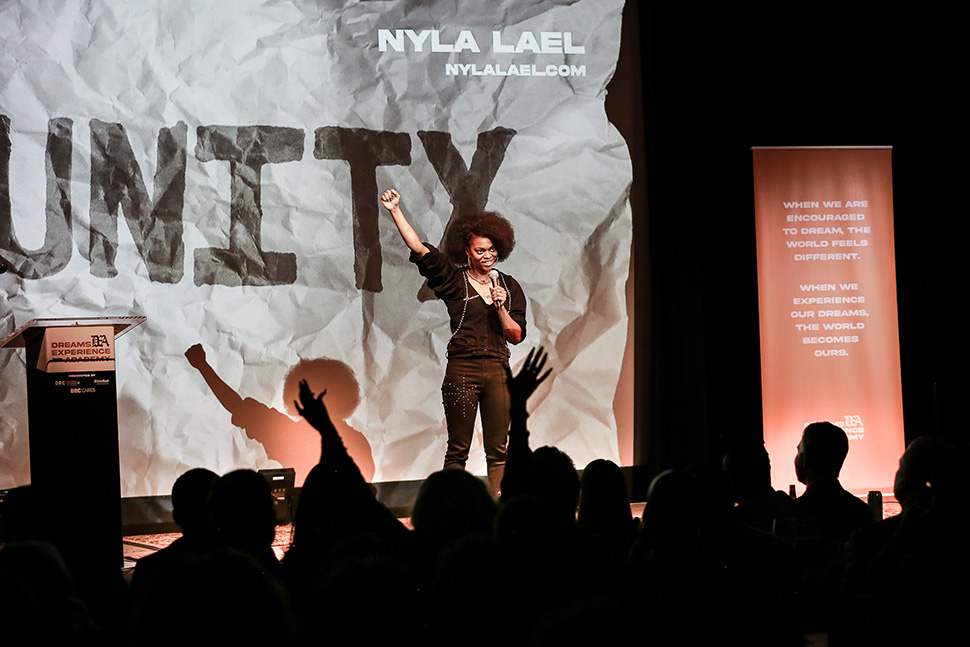
Big Thought student Nyla Lael gave a mesmerizing spoken-word performance. [Photo: Dallas Regional Chamber]
The Kessler program also featured music and spoken-word performances by Big Thought students Jadyn Torres and Nyla Lael, as well as video appearances by The D.O.C.’s friends and supporters. Among these were neo-soul godmother Erykah Badu, Puma Badu—she’s the daughter of Erykah and The D.O.C.—and Cynt Marshall, the former chief executive of the Dallas Mavericks.
Besides Herron Bruff of the Dallas Regional Chamber, in-person speakers included Big Thought CEO Erin Offord; Xavier Henderson, co-founder and chief development officer at For Oak Cliff; Malia Jennings, director of brand marketing for GameSquare; and Brendan Connelly of Bosque Ranch Productions.
Kelley Cornish, president and CEO of the T.D. Jakes Foundation, drew a thunderous ovation when she presented an oversized check to the Dreams Experience Academy for $250,000.
The D.O.C. closed out the formal presentation, putting his hands together in gratitude as he walked slowly onstage. He recounted how screening his yet-to-be-finished documentary—a testament to how he served others, despite his ongoing struggles and pain—had played a key role in galvanizing community support for the award-winning initiative over the last 18 months.
“We’ve done every single thing that we can do to make sure that folks hear our cry: that our children need our help, and it’s our time to do it,” Doc said.
“All these folks stepped up and said, ‘Doc, we see you—more importantly, we feel you—and we are behind you 1,000%,’ ” he went on. “And they began to come to the table with the gifts that I really don’t have the words to say thank you for. All I can say is, God is good, and I am so thankful. … I’m going to do everything in my power, as long as God gives me breath in my lungs, to change our city into that shining city on the hill that we all know.”
One chapter ends, another begins

Kelly Cornish of the T.D. Jakes Foundation addressed the crowd and later presented the DEA with a check for $250,000. [Photo: Dallas Regional Chamber]
In a joint interview with The D.O.C. and Gannett after the program was over, Gannett said that, in addition to the $250,000 check from the Jakes Foundation, he and Doc had just been given a “six-figure gift” for the DEA from another, unnamed entity.
Combined with “sweat equity” from their partners, plus $140,000 in seed money netted earlier from the Dallas Regional Chamber and The Dallas Foundation, the Dreams Experience Academy is a “fully fleshed-out business that’s already operating, probably a little bit over our skis, because now we need to raise to catch up,” Gannett said.
In the meantime, what about that documentary on Doc’s life that’s been in the works for so long? Turns out it’s been assigned a new release date—in 2026.
“It hasn’t unfolded in the way that I feel does the effort justice,” Doc said. “And so, until that moment comes, I’ll just keep building supportive things to lift it until other people see it the way I do.”
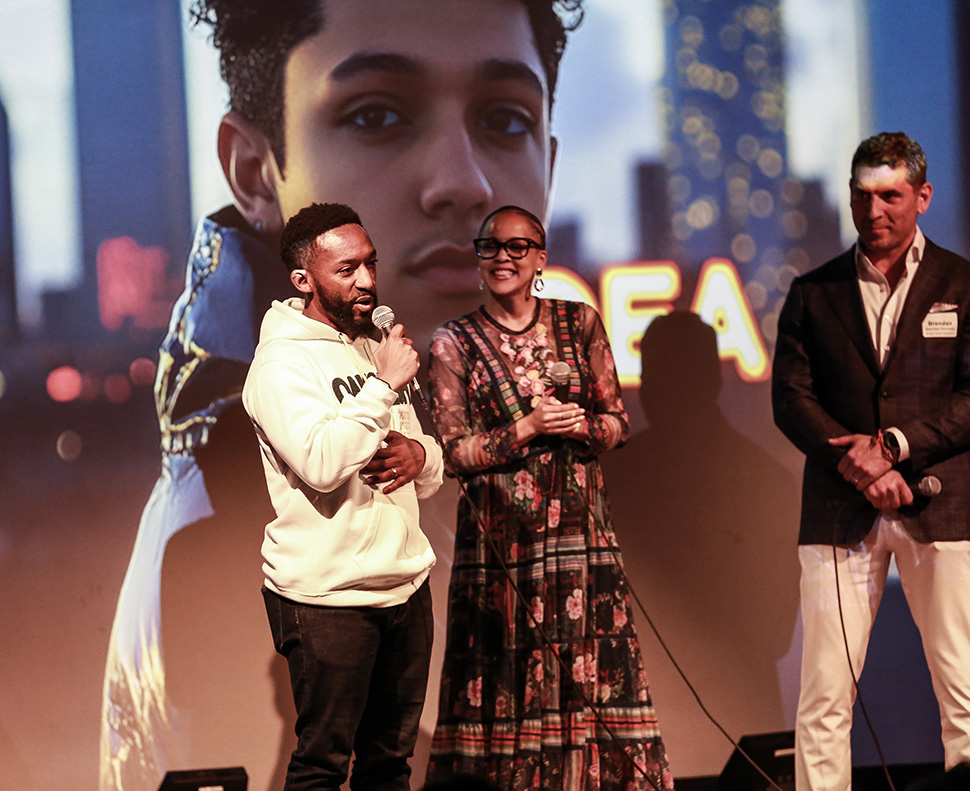
For Oak Cliff’s Xavier Henderson also spoke, while GameSquare’s Malia Jennings and Brendan Connelly of Bosque Ranch Productions looked on. [Photo: Dallas Regional Chamber]
A videographer for the film was sitting a few feet away, his camera trained on Doc and Gannett as they talked.
“The truth is, the story is still unfolding,” Gannett said. “So, the documentary is not just a canon of hip-hop history, but it’s really a view forward into this new chapter of his life.”
“That’s exactly correct,” Doc said. “The end of one chapter is actually the beginning of the next chapter. So, when you look at it in those terms, we’re living the end right now.”
“I look at it like this,” he added. “Everything happened in God’s time, and you’re going to respect this movie because of its purpose. And if you can’t see it the way you’re supposed to see it, then that means you don’t deserve it.”
“It’s also a great example of one of the many projects that are kind of in this constellation circling the DEA,” Gannett said. “So, the children will be able to work on these projects. If it’s an album, if it’s a film, if it’s a television series—all of these commercial activities are happening in orbit around the Dreams Experience Academy. So, it’s all kind of this virtuous environment that we’re creating.”
For underserved Dallas youth—and even for the hip-hop legend himself—Doc’s “prescription” just might be a lifeline.
Don’t miss what’s next. Subscribe to Dallas Innovates.
Track Dallas-Fort Worth’s business and innovation landscape with our curated news in your inbox Tuesday-Thursday.

